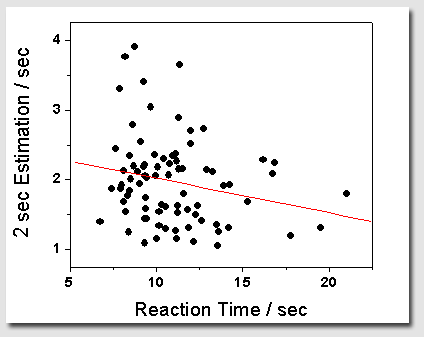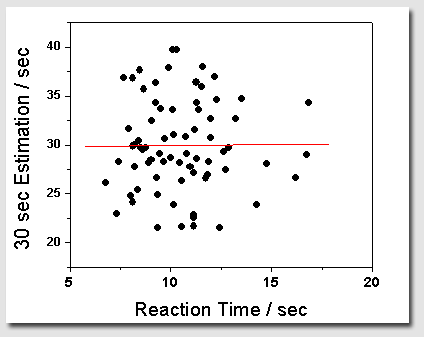 |

| Age |
| 0-20 yrs |
12% |
| 21-30 yrs |
31% |
| 31-40 yrs |
36% |
| 41-50 yrs |
14% |
| 50+ yrs |
7% |
| Politics |
| Liberal |
36% |
| Conservative |
16% |
| Libertarian |
15% |
| Socialist |
10% |
| Hate Politics |
31% |
| Favorite Sports |
| Soccer |
20% |
| Football |
18% |
| Basketball |
12% |
| Baseball |
12% |
| Hockey |
5% |
| Ping-Pong |
3% |
| Cricket |
3% |
| Rugby |
2% |
| Chess |
2% |
| None |
22% |
| Clicking Ants (ave) |
| 5 Ants |
4.8 sec |
| 15 Ants |
12.8 sec |
Ave Reaction Time
of Sports Fans |
| Chess |
9.1 sec |
| Ping Pong |
10.0 sec |
| Cricket |
10.1 sec |
| Soccer |
10.2 sec |
| Football |
10.8 sec |
| None |
11.1 sec |
| Baseketball |
11.2 sec |
| Hockey |
11.2 sec |
| Baseball |
11.8 sec |
| Rugby |
13.9 sec |
| Science TV |
| Any Thing Science |
59% |
| Comedies |
31% |
| Dramas |
3% |
| No Science! |
5% |
| Watch Grass Grow |
| Lovin' it!!! |
16% |
| Likin' it!! |
18% |
| Is ok.! |
24% |
| Eh.. |
10% |
| No Way... |
31% |
Average desire to see grass grow by Science
TV preference |
| Any Thing Science |
Is ok.! (~2.9) |
| Comedies |
Is ok.! (~2.8) |
| Dramas |
Is ok.! (~2.8) |
| No Science! |
Eh.. (~2.2) |
| Perceived Cooking Ability |
| Get me a Show! |
5% |
| Good |
55% |
| Get by |
22% |
| Not so good |
7% |
| Fear me |
11% |
| Guessing Time (ave) |
| 2 Seconds |
1.8 sec |
| 30 Seconds |
24.1 sec |
| Next NASA Mission |
| Onward to Mars |
44% |
| Revisit Moon |
17% |
| Space Ladder |
15% |
| Asteroid Visit |
10% |
| End Program |
16% |
PCT End NASA Program
by Politics |
| Liberal |
8% |
| Conservative |
18% |
| Libertarian |
7% |
| Socialist |
55% |
| Poli. Haters |
19% |
| Color Identification (ave) |
| Actual (9.2 secs) |
5.6 sec |
| Judging Color by Perceived Cooking Ability (using only times scored between 9-11 s) |
| Get me a Show! |
9.43 sec |
| Good |
9.63 sec |
| Get by |
9.65 sec |
| Not so good |
DNQ |
| Fear me |
9.92 Sec |
|
 |

Science is built upon the creation of experiments that explain our observations of the world. In this experiment, Scientific AmeriKen will attempt to connect the popular observation that "the days seem shorter as I get older" and "time seemed to freeze" often said in a panicked moment. In the scientific community observations such as these fall under research involving "timing". As reviewed in a recent issue of nature magazine, our ability to sense time appears to be localized to the basal ganglia portion of the brain where cases of damage to this area result in patients with an impaired ability to sense time. Although it is not completely understood how time is sensed, the prevailing theory, entitled the pacemaker-accumulator model, holds that sensory signals trigger an accumulator that counts pulses from an internal pacemaker. In other words, each memory receives a pulse on a regular time interval and the sense of time arises from counting the pulses. Here Scientific AmeriKen will explore the possibility that one's reaction time may actually be linked to the "internal pacemaker" and thus correlate with sense of time. |

The hypothesis of this experiment is that not only is sense of time modulated by the "internal pacemaker" but reaction time is as well. The idea being that our senses receive information at a steady rate controlled by the pacemaker. This rate dictates and provides a frame of reference for estimation (sense) of time. However, in times of crisis this rate of incoming information is increased - thus - much like a video shot at 48 frames per second and replayed at 24 - time will appear to slow down - giving a person more time to react. Additionally, as we age the internal pacemaker receives information at a slower rate - causing reaction time to decrease and like a video shot at 12 fps and replayed at 24 will appear to be sped up and making the days seem shorter... |

An online survey was prepared to test the hypothesis and can be found here. In order to disguise the purpose of the test, as that may influence results, several questions were included as a diversion and because it was fun to do. In short for the questions that mattered, respondents were first asked to click on 15 randomly placed ants as quickly as possible to measure reaction time. They were then asked to start and stop a button to estimate 2 seconds then 30 seconds to measure sense of time. |

Click here to download data
 Data collected from 115 respondents, ages ranging from 13-80. Results greater than 25 seconds were thrown out as were results less than 1 second for the 2 second estimate and less than 20 seconds or greater than 40 seconds for the 30 second estimation. The reason for this was to exclude participants looking to quickly skip past the question or who fell asleep during.
Data collected from 115 respondents, ages ranging from 13-80. Results greater than 25 seconds were thrown out as were results less than 1 second for the 2 second estimate and less than 20 seconds or greater than 40 seconds for the 30 second estimation. The reason for this was to exclude participants looking to quickly skip past the question or who fell asleep during.
Upon examination of these data a extremely weak correlation appeared (r2=0.04 where 1.00 = completely correlated, r2 is a measure of how close the data points are to the fit line) with reaction time and 2 second estimation. However, there was no correlation seen (r2=0.00) between reaction time and 30 second estimation. This may be due to survey participants becoming bored of the survey.
 |

These data thus far provide extremely weak support for the hypothesis. However, if the correlation were true it would suggest that as reaction time slows the person greater underestimates the amount of time that has passed. A concept if extrapolated over a day would make the day "seem" shorter. Perhaps a reason the correlation was this low was this initial survey is flawed in many respects. The first being the use of diversionary questions probably made participants lose interest or not try on the important questions. Secondly, the survey does not take into account if a user is using a different type of mouse, like a touch pad, that makes two results incomparable. Third, the lack of having users repeat the test added a lot of variability to the data. In spite of the limitations - the first steps by Scientific AmeriKen have been taken into this relatively new field of sense of time and Scientific AmeriKen estimates that it will bring the Max Paine "bullet time" effect to real life in a matter of years... |

|
 |








